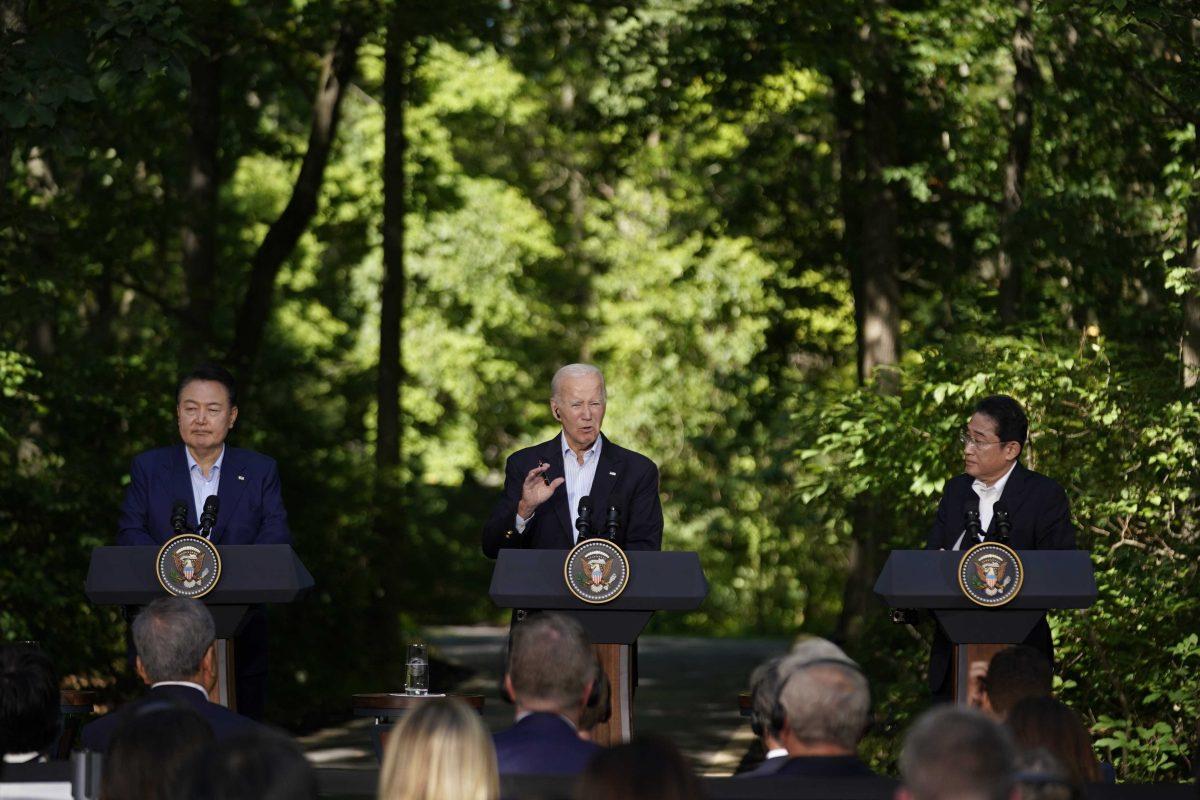President Joe Biden, Japanese Prime Minister Fumio Kishida and South Korean President Yoon Suk Yeol met at Camp David on Aug. 18 to discuss further cooperation between the three countries over regional security and economic ties — including ways to mitigate future supply chain disruptions.
The meeting was fruitful, meaning Biden has inched closer to the elusive goal of a successful “pivot to Asia.” This pivot is a U.S. initiative attempting to further diplomatic and economic ties with countries in the Indo-Pacific region.
Biden’s first Camp David summit with international leaders was a historic meeting between the three countries. While South Korea and Japan have been strong allies of the United States since the beginning of the Cold War, the two countries have suffered from strained relations stemming from the harsh Japanese colonization of Korea during the early 20th century. But with increased global troubles and a rising geopolitical phoenix in China, all three countries have recognized the importance of greater cooperation.
But somehow, this meeting is eerily reminiscent of the past American attempts to gain reliable partners in the Indo-Pacific region. For example, former President Richard Nixon made an ambitious endeavor to normalize relations with China in 1972, which seemed to be an apt maneuver to gain another ally against the Soviet Union.
Nixon speculated that China had the potential to become the greatest nation on Earth in the 21st century. His theory did come true — just not in the way he expected. After the fall of the Soviet Union, America’s most powerful adversary, China filled the void with ease.
To counter Chinese dominance over the Pacific, former President Barack Obama aimed to create a free trade deal that would eliminate tariffs for many of the United States’ Asian trade partners. The ultimately unsuccessful Trans-Pacific Partnership could have strengthened America’s position in the region with 11 eager trade partners.
Fortunately, the rise of American protectionism in both major parties shot down Obama’s flawed attempt to “pivot to Asia,” with 2016 presidential candidates Hillary Clinton and Donald Trump united in their opposition to the trade deal.
Valid concerns over the trade deal arose, with many labor unions and environmental organizations concerned it would lead to further losses of American manufacturing jobs as well as an eventual failure to enforce the worker protections laid out in the deal.
These concerns led President Biden to continue the protectionist stance of former President Donald Trump, with his administration promoting American-made goods. In July 2021, his administration increased the threshold for products to be considered American from 55% to 75%, meaning that at least 75% of any product has to be made here in the United States for it to be considered “Made in America.”
There are benefits to this stance, but it must be balanced to ensure we tap into the increasingly important developing economies in the Indo-Pacific, while also maintaining American economic competitiveness and well-paying jobs.
Consequently, the Camp David talks held on Aug. 18 are a small step to countering Chinese influence in the Pacific and erasing the notable American policy failures in the Indo-Pacific. President Biden wisely saw the need to continue the “pivot to Asia.”
Earlier this year, Biden successfully negotiated with the Philippine President “Bongbong” Marcos over adding American bases in the Philippines, restoring the historically friendly ties between the two countries.
At the end of the day, President Biden is only solidifying ties between countries that have a long history of friendly relations with the United States. Economic deals with other countries in the region are the only way to create an effective “pivot to Asia.”
Securing those deals will be a difficult task to accomplish, especially when both Republicans and Democrats seem to be protectionist and wary of any trade deal. Additionally, the concerns many had with the Trans-Pacific Partnership will undoubtedly apply to any future ambitious free trade agreement.
In some way, Biden will eventually have to reconcile his protectionist agenda with his foreign policy goals. But his meeting in Camp David is a great start to restoring the American international presence that is still reeling from Trump’s unabashed “America First” policy.
Nathaniel Dela Peña is a 20-year-old political science and history senior from Alexandria.








